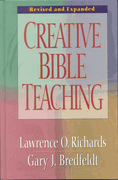
Ross Farley has edited an online article entitled Helping Young People Learn. In his first sentence, Farley says, “It is very important to make the most of opportunities to help young people learn.” I would take it a step farther. I believe it is a sin to teach the Bible poorly when we are given the responsibility and opportunity to do so. And it is just as true for adults as it is for children and teens.
Teaching poorly not only fails to deliver needed truth for application in the learners’ lives, but it also makes learners less interested in future lessons. Farley added that “effective planning enables us to make the most of every minute set aside for teaching.” Further, teachers must realize with the job comes accountability. In James 3:1 (NIV) the author writes, “Not many of you should presume to be teachers, my brothers, because you know that we who teach will be judged more strictly.”
With all of that said, Farley shares five principles for planning an effective learning experience (which is more than just a lesson). I will share his five principles in all capitals and then add my commentary:
-
KNOW YOUR SUBJECT. Spend time with God in His Word. Read. Listen. Study. Reflect. Research. Apply. Ask questions. Farley correctly stated, “You cannot teach what you do not know.” Get out your Bible dictionary. Study trusted commentaries (like the teacher book, pupil book, and others). Study cross references. Research significant words. Check out the history of places, practices, and people. Many articles and Bible tools are available online. First and foremost, however, is to spend time getting to know your Subject, God Himself! When you know Him, you will be much more likely to understand and appropriately apply and teach His Word.
-
TAKE AIM. This is not about what you want to teach or what your Sunday School curriculum has planned for this week. No, it is more about where you are going. What do you need to accomplish? What do your learners need to hear? What do they need to be or do as a result of encountering God in His Word in this passage? In a similar way in which a marksman shooting a rifle will fail to hit the target unless he takes aim, so will your lessons unless you plan them to accomplish your purpose, your aim. Ask yourself as you are planning to achieve your aim, how you will know you have done so. That will make your aim clearer, more likely to be achievable, and easier to evaluate progress.
-
USE A RANGE OF TEACHING METHODS. The worst teaching method is the one you use all the time. Use variety, but do so intentionally. What learners read, they will retain 10% in 72 hours. What they hear, they will retain 20%. What they see, they will retain 50%. But what they say and do, they will retain 90% in 72 hours. If they don’t remember, they will be less likely to learn from it, apply it, and live it out. Each learner has one or two preferred learning styles from which they learn best, but most learning styles will be present in any group above six learners. I have written several blog entries about teaching methods and learning styles, including Balanced Diet of Sunday School/Small Group Teaching Methods, Part 1 and Part 2 and Learning Styles in Adult Sunday School.
-
PITCH CONTENT AT AN APPROPRIATE LEVEL. This begins in prayer and requires knowledge of the learners. Who are they? What do they already know? What is their level of biblical knowledge and experience? What can you build on? How can you stretch learners without teaching over their heads? Farleys adds, “Learning should help young people grow in their knowledge, skills, values, attitudes and behavior.” This is also true for adults and can be especially challenging in an adult Sunday School class when learners are at many different levels.
-
DESIGN A PLAN. Recently Mary Allen left a comment about needing a Sunday School lesson template. While each passage of scripture and each lesson is unique, a somewhat standard plan (or template) can be designed. Farley shares one from Larry Richards’ book, Creative Bible Teaching. In Farley’s words, “Larry Richards outlines a useful structure that is easy to remember. He suggests that learning experiences be planned in four parts that he called hook, book, look and took.” For more information about these four parts, I would recommend purchasing the newly revised version of his book, Creative Bible Teaching, coauthored by Gary Bredfeldt. Another option is to design a lesson (making sure to take aim) with 3 sections: motivation (creating interest); examination (study God’s Word); and application (lead them to practice and commit to live the truth of the Word).
Which of these five principles do you find most difficult? What practices have you put in place that have helped with one or more of these principles? How could the addition of one these principles to your preparation make your lessons more effective? Study. Aim. Use variety. Focus. Plan. Be revolutionary!
Leave a Reply